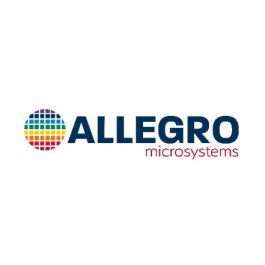Allegro
"Allegro is a global leader in Power and sensing solutions, including ICs for motion control and energy efficiency systems. Join us and you will contribute to exciting technological developments, alongside a friendly team." Andreas, Senior Analog Design Engineer
Our Scholarships
Placement Location
Edinburgh
Type of Placements Offered
• Summer placements • 6-month MEng placements
Restrictions/Notes
(1) No 12-month placements; (2) No first or second year students
2024/25 Scholarships
At least one new scholarship
Who we are and what we do

Headquartered in Manchester, NH (USA), Allegro MicroSystems, Inc. is a global leader in semiconductor technology. With more than 4,600 employees, we serve a wide variety of customers in e-Mobility and industrial markets, and our innovations in sensor and power integrated circuits (ICs) enable advancements in motion control and energy-efficient systems. Anyone who drives a car, generates electricity using solar panels, or uses cloud data services interacts with Allegro’s technology —and we could not be prouder of how these intelligent solutions come to life to make daily processes more effective, convenient, and sustainable.
In the decades since Allegro was founded, our commitment to Innovate with Purpose has empowered our success and enabled us to remain a trusted partner both to large enterprises and regional market leaders. We create advanced semiconductor technology and application-specific algorithms that give customers the competitive edge they need to make breakthroughs in important areas like advanced mobility, clean energy, and factory automation.

What you could be doing during your work placement
At Allegro MicroSystems, placements could provide experience in the following integrated circuit (IC) and software (Embedded/PC) development disciplines:
- Mixed-signal design, simulation, and characterization of power IC control IP blocks
- Motor Control design for Automotive and Industrial systems for next generation Electric Vehicles
- Various IC design tools including Cadence Virtuoso Analog Design Environment, Spectre, ams, MMSIM, MATLAB/Simulink, ARM Kiel Micro-vision, etc
- Evaluation of advanced motor control ICs in real-world automotive applications
- Software Verification and Validation (V &V) of the Embedded System on Chip (SoC) and PC application software’s integral to the intelligent Motor Control product
Meet one of our Scholars

Name: Jan
Sponsor: Allegro MicroSystems
University: University of Edinburgh
Degree Course: MEng Electrical and Mechanical Engineering
What appeals to you about Electronics?
What draws me to electronics the most is the potential to be a part of something that transforms our everyday lives. Whether it’s automotive industry, robotics or sustainable energy, electronics plays an essential part in the development of current innovations. Personally, I am particularly excited about the advancements in autonomous vehicles and the influence it could have on the future of transportation.
Why did you want a scholarship with Allegro MicroSystems?
In the application process, I was mainly interested in companies focused on the automotive sector. Allegro’s products caught my attention due to their application in the motor control and powertrain solutions, which were related to my work in the student society.
Additionally, an important factor was the nature of the interview, where I could share details about the projects I was involved in rather than focusing solely on the technical questions. This stood out to me from the other interviews and created a very welcoming atmosphere.
My placement and its value
Throughout my time at Allegro, I was part of the Systems Team, responsible mainly for verification and validation and technical support of the existing products.
During the first internship, I worked on the customer support issues, where I learned about IC verification and fault analysis as well as prepared technical documentation based on my tests. Additionally, based on discussions with my supervisor, the team has also given me an opportunity to develop PCB design skills.
My six months MEng placement with Allegro was focused more on a single larger project, where I worked on bench test automation. By designing software using MATLAB, I not only greatly developed my programming skills, but also learned about industry standards.
What I really appreciate about my placements is being introduced to multiple aspects of the job, especially with such an amazing and supportive team.
What are your hobbies and interests?
In my free time, I enjoy travelling and playing different racket sports like tennis, padel, or pickleball. I’m also passionate about all types of sci-fi, from books to movies and games.
Meet one of our Engineers

Name: Payal
Job Title: Mixed Signal Verification Engineer
About me
I hold a Master’s degree in Embedded Systems and IC Design from Liverpool John Moores University, which laid the foundation for my passion in the field of Mixed Signal Design and Verification. I began my career at Allegro Microsystems as a Mixed Signal Design and Verification Engineer, where I’ve had the opportunity to work on a wide range of projects. With over four years hands-on experience, I am driven by the challenge of integrating technical expertise with creative solutions, and I remain committed to expanding my knowledge to drive innovation in the industry.
Why Engineering?
Engineering, to me, is not just about solving technical problems—it’s about creating lasting impacts on society and shaping the future. From a young age, I was inspired by the potential of technology to improve lives, and that passion guided me through my academic journey in electronics engineering. What began with small science projects in school evolved into major projects during university and culminated in the large-scale, impactful projects I work on today. My focus remains on delivering solutions that meet the demands of today, while fostering sustainable innovation for tomorrow.
What I do
At Allegro MicroSystems, I started my journey as a Mixed Signal Design and Verification Engineer, diving into my first project with a determination to excel. This mini project marked the beginning of my specialization in mixed signal verification, allowing me to deepen my understanding of analog circuits and digital components.
Currently, I am responsible for pre-silicon verification, where I work on a range of tasks including:
- Developing and aligning test-benches and stimuli generation
- Verifying integrated circuit blocks such as amplifiers, comparators, and oscillators in mixed-signal environments
- Running simulations, analysing results, and conducting verification reviews
- Creating verification plans and shaping methodologies to enhance reusability
- Innovating performance and functional verification flows using scripting techniques
My work involves combining technical precision with innovative problem-solving, ensuring that our designs meet the highest standards of performance and reliability.
What it’s like to work at Allegro MicroSystems
Over the past two years, Allegro MicroSystems has provided me with a platform to grow both professionally and personally. The company fosters a friendly and supportive work environment that encourages innovation and the sharing of ideas. I’ve benefited from opportunities to contribute to the company’s success, and Allegro’s commitment to work-life balance and personal well-being—through initiatives like yoga sessions and mental health support—has made it an ideal workplace. Additionally, the emphasis on women’s empowerment and the inclusion of junior engineers’ voices in decision-making processes reflects the company’s dedication to nurturing future talent and driving progress through diversity.